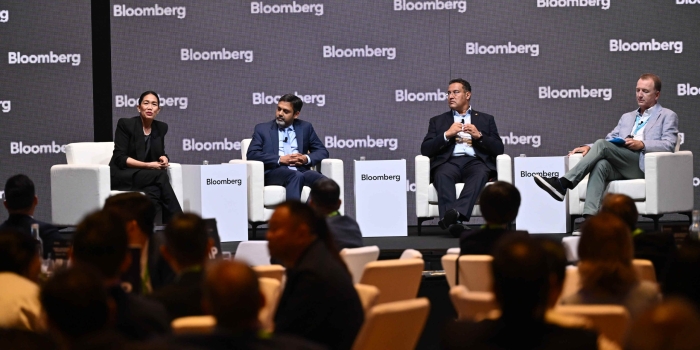Using Collaboration and Science for Conservation
The private sector can play an important role in conservation – that was the message Lucita Jasmin drove home at Conservation Asia 2016. APRIL Group’s Director of Sustainability & External...

Latest updates on what's happening in RGE Group

At the recent “Bringing Balance to the Energy Transition” panel at the Bloomberg Spotlight on ASEAN Business 2024 event in Singapore, Lucita Jasmin, Group Sustainability Director at RGE, highlighted the critical role energy transition plays in the company’s sustainability strategy and broader business goals. She was joined by Sushil Purohit, CEO of Gentari; Ajay Shah, Vice President of Shell Energy Asia; and moderator Daniel Moss, Bloomberg Opinion Columnist.
The term “energy transition” has diverse meanings depending on context, but at its core, it represents a shift from traditional energy sources like fossil fuels to cleaner, renewable alternatives.
For RGE, a global group of companies that are operating at the heart of the bioeconomy, this transition is not a regulatory obligation, but an essential part of its long-term strategy. Having set ambitious goals such as reducing emissions intensity by up to 50% and reaching net zero by 2050, RGE is aiming for transformative shifts in its energy mix.
According to Lucita, “Energy transition is an integral part of our sustainability commitment. And a key pillar of that commitment has to do with our decarbonisation.”
RGE’s energy transition journey started with its pulp mills in Indonesia. Currently, these mills operate on 88% biomass, a renewable energy source derived from the by-products of the production processes. By 2030, its aim is to increase this figure to up to 95%.
Moreover, RGE has since 2019 steadily expanded its solar installations which now boast 13.5 megawatts of solar power in Indonesia, and plans to scale this up to 50 megawatts by the end of the decade.
In addition, RGE’s agribusiness operations are converting methane from palm oil mill effluent into renewable energy, contributing another 20 megawatts through biogas plants.
Sustainable economic development requires comprehensive efforts to reduce greenhouse gas emissions and mitigate climate risks, in line with the Paris Agreement.
Lucita highlighted the need to enhance regional energy cooperation and advance renewable energy initiatives in Southeast Asia. One milestone is the recent Conditional Approval by Singapore’s Energy Market Authority for TotalEnergies and RGE, through their joint venture, to import 1.0 gigawatt of reliable solar photovoltaic energy from Indonesia to Singapore.
Another area of decarbonisation is aviation. Lucita shared details of RGE’s joint venture with Cepsa in Spain to produce Sustainable Aviation Fuel (SAF) from agriculture waste and residue and used cooking oil. With extensive oil palm plantations and manufacturing facilities in Indonesia and Malaysia, this presents opportunities for the group to expand SAF production, decarbonise aviation and create new revenue streams.
“Sustainable aviation fuel, compared to fossil fuel, is supposedly going to reduce emissions by up to 80%, but the current use of SAF is only at 0.1%,” Lucita explained. “Now we are able to produce SAF using the effluent or the agri waste from oil palm manufacturing.”
As global industries increasingly recognise the urgency of addressing climate change, the energy transition has become a mainstream business imperative. For RGE, the energy transition is not merely about mitigating risks – it is also about capitalising on opportunities. Through its investments in biomass, solar and waste-to-energy projects, RGE is charting a path toward a more sustainable future.